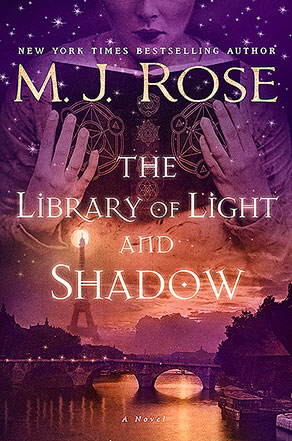THE BOOKS


Selected by Indie Booksellers for the Indie Next List.
EXCERPT
The Library of Light and Shadow
Chapter One
Silk lined the blindfold. Deep maroon in color, so dark, like dried
blood. Magenta mixed with black if I were to create it on my palette.
As I slipped it over my face, I felt the smooth fabric caress my cheeks,
cool and delicious.
I recognized a familiar and particular combination of feelings
well up in me: expectation, excitement, and the thrill of fear. Guilt
that I was peeking in on what was not my right to see and bliss at
giving in to the irresistible temptation to look deeper despite a potentially
dangerous outcome.
With the blindfold on, I felt more at home in the world than at
any other time. Except when Mathieu held me in his arms. But those
days were long past, and my life was so different now that I often
wondered if my brief time with him was real or imagined.
Adjusting the elastic wrapped around my head, positioning the
blindfold just the right way, I saw only darkness. Not a sliver of light
invaded its black.
Around me the sounds of the party faded. In the silver and black
living room high above Central Park, the guests were still laughing
and talking, drinking champagne, admiring their reflections shimmering
in the huge round mirror over the fireplace.
But I had left the pleasures and attractions of the party and
slipped inside a shell. Cocooned, I focused on sounds of rolling
waves. Memories dredged from the beach in Cannes where I grew
up. The sea echoes relaxed me, lulled me... I let go of the tensions of
the actual world, opened to the magic. I became receptive.
“Delphine, aren't you ever going to draw me?” The impatient
whine from the slightly drunk partygoer splashed into my thoughts
like a rock thrown into that blue-green water.
I reacted to her entreaty more slowly than usual. I never drank
when I was drawing, but that night, for some reason, I'd felt nervous
and had a bit of champagne. The good French stuff, smuggled into
America so that all these bright young things could drink it out
of wide-mouthed glasses imported — just like the wine — from my
home country. Fine Baccarat or Lalique you could crush by holding
too tightly. Crystal picking up the lights and sending rainbow
flickers onto the walls and the men's starched white shirts and the
women's beaded gowns. With my blindfold on, all was possible, and
if I listened hard enough, I could even hear the effervescence in that
champagne bubbling to the surface.
Breaking the law was never as much fun as it was in 1925, in this
other city of lights, New York. Everyone who had lived through the
Great War was still running away from its horrors. Trying to forget.
Skyscrapers rose overnight, changing the landscape, dreamed up
from the minds of architects determined to prove that tomorrow
held promise. Painters, sculptors, furniture designers embraced the
rounded lines and geometric cleanliness of Art Deco in their effort
to give the world order. Lovers threw out all rules of propriety. Having
affairs became as acceptable as indulging in bonbons. Seduced by
the allure of motoring trips, we all took off in sleek, elegant cars that
shone in the sun like jewels as we tried to outrace the past. Everyone,
it seemed, smoked opium or marijuana at soirees that never really
ended. All of us were desperate to believe that the future could be as
bright as the moon, which we watched fade in the sky while we kept
partying — gay and delighted and sad and lost.
Between the fingers of my right hand, I held the silver pencil that
my father had given me on my sixteenth birthday, warming the precious
metal. I could feel my name, Delphine Duplessi, engraved in
script on the barrel.
Reaching out with my left hand, my fingers felt for the edge of
the smooth paper. I had my boundary and began to draw. The air
around me grew cooler and swirled like a vortex, as if I were caught
in an unrelenting current, the way it sometimes did. A harbinger of
disaster. I wanted to stop, but once I'd begun a session, I wasn't capable
of ending it prematurely.
Sittings for full shadow portraits, as I called them, took place
over several days at the Tenth Street studios where William Merritt
Chase had once had his own studio and I now had mine. This sketch
was merely a party favor. An amuse-bouche of what I could do. A live
advertisement for more work. I took every commission my brother
Sebastian arranged for me, but it was difficult for him to manage my
career from across the ocean in France. I needed to supplement my
income.
The new year promised to be my best ever. I was becoming wildly
popular. When I worked, I wore a uniform of a simple white smock
over a dark skirt, but at parties I had the appearance of a chic guest —
dressed in the fashionable slim shift that hit just above the knees
with feathers and fringe, bejeweled in the bespoke pieces my sister
Opaline created for me. I spoke with a French accent and provided
just the kind of entertainment the city's avant-garde hostesses craved.
It was only February, and I was booked through May.
That cold night, with the guests partying on around me, my hand
moved quickly as I filled the page with the image developing in the
deepest recesses of my mind. The process, a mystery even to me, involved
only two steps.
First, for a period of about three minutes, I studied the sitter's
face, noticing its planes and curves, lines and contours. I didn't search.
Didn't question. Didn't engage in conversation. I just observed. Usually, my sitter squirmed a little after the first ten or twenty seconds.
Most people are unaccustomed to being specimens. My staring was
often uncomfortable for them. Only Tommy Prout, the man I was
engaged to, had enjoyed it, but he'd been flirting. And he — unlike
anyone I'd ever met — had no shadow secrets. Not one. Probably
what attracted me to him. That and his love of art. His parents were
collectors, and he treated me like one of the masterpieces that graced
the walls of their Beekman Place mansion. I, foolishly, thought that
would be enough.
During a session, once I burned the sitter's face into my mind, I
would slip on my blindfold, shut out the noise of the party, and concentrate
on hearing the sounds of the sea stored in my memory. And
then, listening to the waves pound the shore, I would start to draw,
letting my imagination take over. It is easier to describe it thus, but
in fact it was my second sight that took over.
Because, you see, I was not just an artist. I was a woman who had
been blinded as a child and whose sight had been brought back by
magick. And in the process, I had been given a gift — or, depending
on your point of view, a curse. I had the ability not just to see people
for who they were but also to see the secrets they harbored. The darkest,
most hidden desires of their souls.
And like a thief, I plucked those images from their hearts and
turned them into a parlor game. Surrealistic caricatures they could
take home and frame. Or burn. And therein lay the source of my
compassion, my sorrow, and my own ruination.




